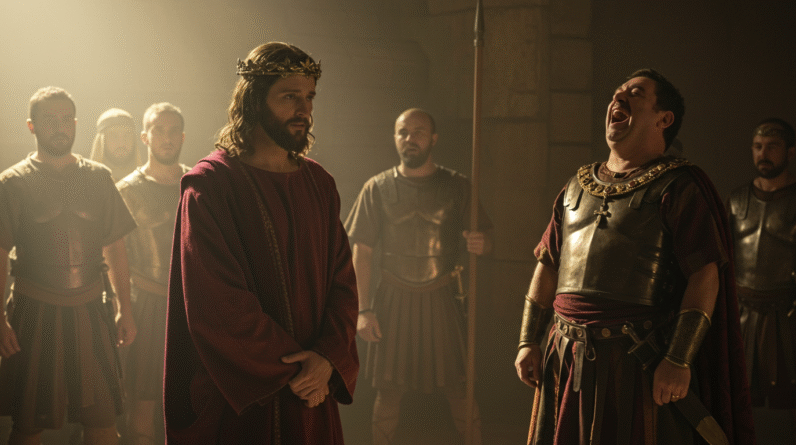Haman in Esther: pride set him on a path of destruction—but God’s providence worked through Esther’s courage. A timeless reminder that justice always prevails.
Haman in Esther: Pride, Prejudice, and Providence
Introduction
Imagine a scene where opulence is the norm, where courtiers flatter and conspiracies brew in the shadows of ancient palaces. In the Book of Esther, this is where we meet Haman, a man whose story is defined by towering pride, deep-seated prejudice, and ultimately, providence’s unpredictable twist. If you’re intrigued by stories where human flaws meet divine intervention, you’re in the right place. Let’s explore how one man’s ambition collided with a greater plan he could never foresee.
📖 Key Verse or Passage
To ground our exploration, let’s begin with a pivotal moment in the narrative: Esther 3:5-6, where we read about Haman’s reaction to Mordecai’s refusal to bow to him. Here, Haman’s pride and prejudice spark a series of events leading to his downfall.

Pride: Haman’s Towering Conceit
The Seed of Arrogance
The core of Haman’s character is his enormous pride, a trait that clouds his judgment and leads to his ultimate ruin. As second in command to King Xerxes, Haman revels in his stature, demanding not just respect but adulation from everyone around him. His pride is not merely personal but extends to his lineage and position, as if they confer upon him an unquestionable superiority. This pride blinds him to the moral and ethical implications of his actions, particularly when dealing with those he deems beneath him.
The Trappings of Ego
Haman’s ego is further magnified when Mordecai, a Jew, refuses to offer him the deference he believes he deserves. In Esther 3:2, Mordecai’s simple act of defiance becomes a wound to Haman’s pride that he cannot ignore. His arrogance convinces him that Mordecai’s slight is not an individual matter but a blemish on his honor that must be avenged. It’s this inflated self-importance that fuels a dangerous vendetta, not just against Mordecai, but an entire people.
Prejudice: A Deep-Rooted Hatred
The Historical Grudge
Haman’s prejudice against the Jews isn’t a spontaneous hatred; it has roots that go deep into the history of his ancestors. As an Agagite, Haman carries the historical enmity between the Amalekites and the Israelites, a feud that dates back centuries. This background is crucial in understanding why Haman’s hatred isn’t just reactive but deeply ingrained—a prejudice that is cultural and historical.
The Enactment of Bias
In Esther 3:8, Haman capitalizes on his influence, presenting a case to King Xerxes to annihilate the Jews, describing them as a people whose customs are different and who do not obey the king’s laws. This portrayal stokes fear and justifies his genocidal plot. Haman’s prejudice blinds him to the individuality of the people he’s condemning, reducing them to stereotypes that serve his agenda. This section of the story underlines how unchecked bias can be weaponized to devastating effect.
Providence: The Unseen Hand
The Unexpected Turn
What Haman fails to account for is the intricate weaving of providence behind the scenes. The Book of Esther reveals a clever series of plans orchestrated by Esther and Mordecai that lead to Haman’s undoing. Their strategy is inspired, relying on timing, royal favor, and the king’s susceptibility to Esther’s charm and wisdom.
The Reversal of Fortune
In Esther 7:10, you’re witness to one of the most dramatic reversals in biblical narratives—Haman is executed on the very gallows he built for Mordecai. This unexpected turn isn’t simply karma but a vivid illustration of a divine justice playing out over human affairs. It’s a reminder of the unpredictable interplay between human arrogance and divine oversight.
Conclusion
Haman’s story is a cautionary tale about the pitfalls of pride and the destructive power of prejudice. Yet, it’s also a story of hope—demonstrating how providence can redeem situations that seem hopelessly dire. While Haman’s downfall is certain, it never dims the remarkable narrative of resilience and courage found in Esther and Mordecai.
As you ponder the lessons from this ancient yet timeless story, consider how pride and prejudice might manifest in today’s world, and where you might see the hand of providence in your own life.

🔍 Explore More Bible Insights:
✅ 1. Serving God by Serving Others
Tone: Practical, inspirational, servant-hearted
🔹 “Live Out Your Faith with These Reads”
✅ 2. The Prayer of Jabez – 1 Chronicles 4:10
Tone: Encouraging, bold faith, personal growth
🔹 “Ask Boldly, Live Fully – Keep Reading”
✅ 3. The Promise of Eternal Life – 1 John 2:25
Tone: Reassuring, hope-filled, theological
🔹 “Secure in Christ – Explore More”
✅ 4. Lessons from the Battle of Jericho – Joshua 6
Tone: Obedience, victory through faith, historical insight
🔹 “Victory Through Faith – Read Next”
As a ClickBank Affiliate, I earn from qualifying purchases.
Acknowledgment: All Bible verses referenced in this article were accessed via Bible Gateway (or Bible Hub).
“Want to explore more? Check out our latest post on Why Jesus? and discover the life-changing truth of the Gospel!”








